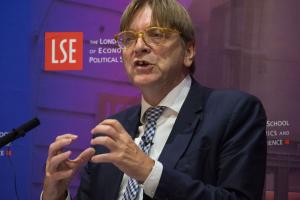Reaching an agreement on the divorce settlement is necessary before consideration of a future trade deal is possible, the bloc’s senior figures have said.
At a press conference on Thursday chief negotiator Michel Barnier warned a transition to phase two of talks could take “months”.
Among the issues that must be settled are Britain’s final divorce bill and other financial payments, the future of EU citizens in the UK and how the Irish border will function.
As European leaders’ met in Tallinn, Estonia, on Friday, Mr Juncker said: “By the end of October we will not have sufficient progress. At the end of this week I am saying that that there will be no sufficient progress from now until October unless miracles would happen.”
Speaking at the summit Theresa May insisted “good progress” had been made on the question of European citizens’ future rights.
She said she was “pleased that the negotiations have been making progress and I look forward to developing that deep and special partnership with the EU”.
MEPs will stage a vote on 3 October to decide whether sufficient progress has been made—and it will take place just ahead of the Prime Minister’s speech to the Conservative conference.
The announcement of the ballot at the beginning of September came as sources told The Independent there was not “a cat’s chance in hell” the European Parliament would endorse the progress of talks.
A negative vote by MEPs would heap pressure on Ms May, who has faced behind-the-scenes squabbling among senior ministers, as well as a very public intervention by Foreign Secretary Boris Johnson, over Brexit.
Mr Juncker’s latest intervention suggested the Prime Minister’s widely anticipated speech in Florence last week had not done enough to avert a “no” vote, despite Mr Barnier having praised its “constructive spirit”.
Irish Taoiseach Leo Varadkar also said it was “very evident that there’s more work to be done”.
He said: “We’re not yet at the stage where we can say that sufficient progress has been made to allow us to talk about the new relationship and trade.”





No comments: